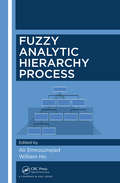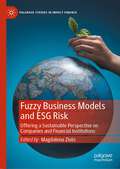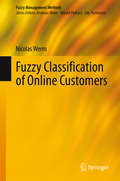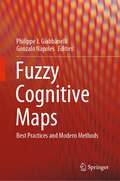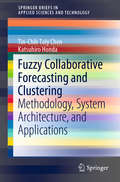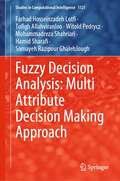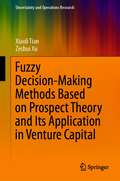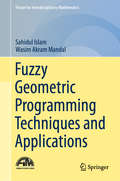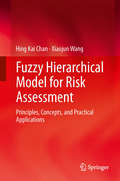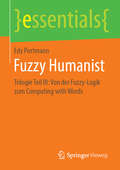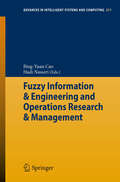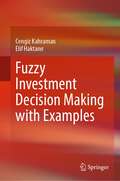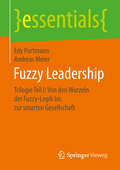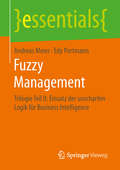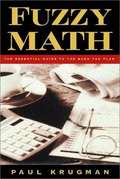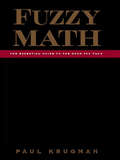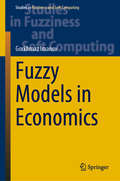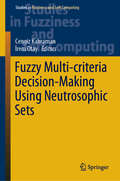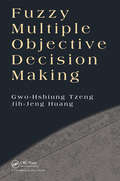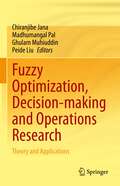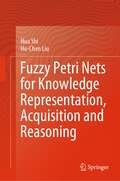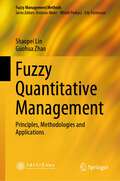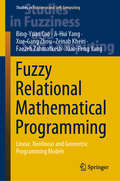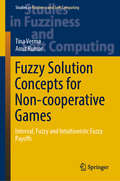- Table View
- List View
Fuyao Glass: Americas Sourcing Decision
by Willy ShihIn today's global economy, what are the factors that go into production location choice? This case is set in the world's largest automotive glass producer as it expands from China into the United States. To meet a very aggressive cost target, management is faced with the alternatives of fulfilling the contract from its new Ohio factory, which can only produce above the target cost currently because it is still on a learning curve, or it can fulfill from its Tianjin, China factory which can produce below the cost target but will incur extensive shipping costs and require a far great amount of inventory holding. This case examines a core question facing managers who want to produce physical products for world markets.
Fuzzy Analytic Hierarchy Process
by Ali Emrouznejad William HoThis book is the first in the literature to present the state of the art and some interesting and relevant applications of the Fuzzy Analytic Hierarchy Process (FAHP). The AHP is a conceptually and mathematically simple, easily implementable, yet extremely powerful tool for group decision making and is used around the world in a wide variety of decision situations, in fields such as government, business, industry, healthcare, and education. The aim of this book is to study various fuzzy methods for dealing with the imprecise and ambiguous data in AHP. Features: First book available on FAHP. Showcases state-of-the-art developments. Contains several novel real-life applications. Provides useful insights to both academics and practitioners in making group decisions under uncertainty This book provides the necessary background to work with existing fuzzy AHP models. Once the material in this book has been mastered, the reader will be able to apply fuzzy AHP models to his or her problems for making decisions with imprecise data.
Fuzzy Business Models and ESG Risk: Offering a Sustainable Perspective on Companies and Financial Institutions (Palgrave Studies in Impact Finance)
by Magdalena ZioloThis book discusses fuzzy business models and focuses on using fuzzy logic in business processes from the perspective of financial institutions when integrating ESG factors and risk. Developing and examining sustainable business models requires an appropriate methodology that would consider the specificity of business models because the measurement of this phenomenon is often based on values from specific ranges and requires a fuzzy approach. According to the law, regulations, and recommendations, financial institutions and businesses must incorporate Environmental Social Governance factors and ESG risk in their decision-making process. Sustainable financial institutions include ESG risk in their risk management system, strategies, and policies. As a result, they hope to mitigate ESG risk and create sustainable value in their business models with an impact on sustainable value creation. This book discusses this phenomenon in detail.One of the first on the market to address the issue of fuzzy business models, the book also deals comprehensively with the fuzzy logic in modeling business processes, decision-making processes, and business models using examples from financial institutions, and will be of interest to researchers, professors, and students of sustainable finance, banking, and sustainable development alongside corporate sustainability.
Fuzzy Classification of Online Customers
by Nicolas WerroThis book introduces a fuzzy classification approach, which combines relational databases with fuzzy logic for more effective and powerful customer relationship management (CRM). It shows the benefits of a fuzzy classification in contrast to the traditional sharp evaluation of customers for the acquisition, retention and recovery of customers in online shops. The book starts with a presentation of the basic concepts, fuzzy set theory and the combination of relational databases and fuzzy classification. In its second part, it focuses on the customer perspective, detailing the central concepts of CRM, its theoretical constructs and aspects of analytical, operational and collaborative CRM. It juxtaposes fuzzy and sharp customer classes and shows the implications for customer positioning, mass customization, personalization, customer assessment and controlling. Finally, the book presents the application and implementation of the concepts in online shops. A detailed case study presents the application and a separate chapter introduces the fuzzy Classification Query Language (fCQL) toolkit for implementing these concepts. In its appendix the book lists the fuzzy set operators and the query language's grammar.
Fuzzy Cognitive Maps: Best Practices and Modern Methods
by Philippe J. Giabbanelli Gonzalo NápolesThis book starts with the rationale for creating an FCM by contrast to other techniques for participatory modeling, as this rationale is a key element to justify the adoption of techniques in a research paper. Fuzzy cognitive mapping is an active research field with over 20,000 publications devoted to externalizing the qualitative perspectives or “mental models” of individuals and groups. Since the emergence of fuzzy cognitive maps (FCMs) back in the 80s, new algorithms have been developed to reduce bias, facilitate the externalization process, or efficiently utilize quantitative data via machine learning. It covers the development of an FCM with participants through a traditional in-person setting, drawing from the experience of practitioners and highlighting solutions to commonly encountered challenges. The book continues with introducing principles of simulations with FCMs as a tool to perform what-if scenario analysis, while extending those principles to more elaborated simulation scenarios where FCMs and agent-based modeling are combined. Once an FCM model is obtained, the book then details the analytical tools available for practitioners (e.g., to identify the most important factors) and provides examples to aid in the interpretation of results. The discussion concerning relevant extensions is equally pertinent, which are devoted to increasing the expressiveness of the FCM formalism in problems involving uncertainty. The last four chapters focus on building FCM models from historical data. These models are typically needed when facing multi-output prediction or pattern classification problems. In that regard, the book smoothly guides the reader from simple approaches to more elaborated algorithms, symbolizing the noticeable progress of this field in the last 35 years. Problems, recent references, and functional codes are included in each chapter to provide practice and support further learning from practitioners and researchers.
Fuzzy Collaborative Forecasting and Clustering: Methodology, System Architecture, and Applications (SpringerBriefs in Applied Sciences and Technology)
by Tin-Chih Toly Chen Katsuhiro HondaThis book introduces the basic concepts of fuzzy collaborative forecasting and clustering, including its methodology, system architecture, and applications. It demonstrates how dealing with disparate data sources is becoming more and more popular due to the increasing spread of internet applications. The book proposes the concepts of collaborative computing intelligence and collaborative fuzzy modeling, and establishes several so-called fuzzy collaborative systems. It shows how technical constraints, security issues, and privacy considerations often limit access to some sources. This book is a valuable source of information for postgraduates, researchers and fuzzy control system developers, as it presents a very effective fuzzy approach that can deal with disparate data sources, big data, and multiple expert decision making.
Fuzzy Decision Analysis: Multi Attribute Decision Making Approach (Studies in Computational Intelligence #1121)
by Witold Pedrycz Tofigh Allahviranloo Farhad Hosseinzadeh Lotfi Hamid Sharafi Mohammadreza Shahriari Somayeh Razipour GhalehJoughAuthored by a leading expert in the field, this book introduces an innovative methodology that harnesses the power of fuzzy logic to enhance decision-making in multi-attribute scenarios. In a world of complexity and uncertainty, effective decision-making is paramount. Springer proudly presents a cutting-edge publication that revolutionizes decision analysis: "Fuzzy Decision Analysis: Multi-attribute Decision-Making Approach." This book stands at the forefront of decision analysis, introducing the integration of fuzzy logic into multi-attribute decision-making. It is a transformative journey into the realm of advanced decision analysis. It book not only equips you with the knowledge to comprehend the theoretical underpinnings but also empowers you to apply these insights in practical scenarios. This book serves as your indispensable companion. Its comprehensive coverage serves as a beacon, guiding you through the intricate maze of fuzzy logic and multi-attribute decision-making, ultimately empowering you to embrace innovation and master the art of making well-informed decisions in an ever-changing world.
Fuzzy Decision-Making Methods Based on Prospect Theory and Its Application in Venture Capital (Uncertainty and Operations Research)
by Zeshui Xu Xiaoli TianThis book gives a thorough and systematic introduction to the latest research results about fuzzy decision-making method based on prospect theory. It includes eight chapters: Introduction, Intuitionistic fuzzy MADM based on prospect theory, QUALIFLEX based on prospect theory with probabilistic linguistic information, Group PROMETHEE based on prospect theory with hesitant fuzzy linguistic information, Prospect consensus with probabilistic hesitant fuzzy preference information, Improved TODIM based on prospect theory and the improved TODIM with probabilistic hesitant fuzzy information, etc. This book is suitable for the researchers in the fields of fuzzy mathematics, operations research, behavioral science, management science and engineering, etc. It is also useful as a textbook for postgraduate and senior-year undergraduate students of the relevant professional institutions of higher learning.
Fuzzy Geometric Programming Techniques and Applications (Forum for Interdisciplinary Mathematics)
by Sahidul Islam Wasim Akram MandalThis book develops the concepts of various unique optimization techniques in the crisp and fuzzy environment. It provides an extensive overview of geometric programming methods within a unifying framework, and presents an in-depth discussion of the modified geometric programming problem, fuzzy geometric programming, as well as new insights into goal geometric programming. With numerous examples and exercises together with detailed solutions for several problems, the book also addresses fuzzy multi-objective geometric programming techniques. Geometric programming, which falls into the general class of signomial problems, has applications across disciplines, from engineering to economics, and is extremely useful in applications of a variety of optimization problems. Organized into thirteen chapters, this book is a valuable resource for graduate and advanced undergraduate students and researchers in applied mathematics and engineering.
Fuzzy Hierarchical Model for Risk Assessment
by Hing Kai Chan Xiaojun WangRisk management is often complicated by situational uncertainties and the subjective preferences of decision makers. Fuzzy Hierarchical Model for Risk Assessment introduces a fuzzy-based hierarchical approach to solve risk management problems considering both qualitative and quantitative criteria to tackle imprecise information. This approach is illustrated through number of case studies using examples from the food, fashion and electronics sectors to cover a range of applications including supply chain management, green product design and green initiatives. These practical examples explore how this method can be adapted and fine tuned to fit other industries as well. Supported by an extensive literature review, Fuzzy Hierarchical Model for Risk Assessment comprehensively introduces a new method for project managers across all industries as well as researchers in risk management. this area.
Fuzzy Humanist: Trilogie Teil III: Von der Fuzzy-Logik zum Computing with Words (essentials)
by Edy PortmannAuch mit Worten, Phrasen, Präpositionen, Fragen sowie anderen semantischen Einheiten der natürlichen Sprache ist es möglich, zu rechnen. Daher ist diese Methode für einen Einsatz im Sinne des Humanismus prädestiniert. Edy Portmann erläutert den Zusammenhang von Fuzzy-Logik und dem Rechnen mit Worten und zeigt daran den Unterschied zwischen heutigen Suchmaschinen sowie zukünftigen Frage-Antwort-Systemen auf. Er legt dar, wie das Rechnen mit Worten als Grundlage einer Mensch-Maschine-Symbiose dient, die in kollektiver (urbaner) Intelligenz mündet. Als Ausblick weist der Autor darauf hin, wie Computing with Words zur Schaffung von kollektiver Intelligenz beitragen kann.Der Autor:Prof. Dr. Edy Portmann ist Swiss Post Professor of Computer Science am Human-IST Institut der Universität Fribourg, Schweiz. In seiner Forschung beschäftigt er sich mit Fragen rund um Informationssysteme, -verarbeitung und -beschaffung.
Fuzzy Information & Engineering and Operations Research & Management
by Bing-Yuan Cao Hadi NasseriFuzzy Information & Engineering and Operations Research & Management is the monograph from submissions by the 6th International Conference on Fuzzy Information and Engineering (ICFIE2012, Iran) and by the 6th academic conference from Fuzzy Information Engineering Branch of Operation Research Society of China (FIEBORSC2012, Shenzhen,China). It is published by Advances in Intelligent and Soft Computing (AISC). We have received more than 300 submissions. Each paper of it has undergone a rigorous review process. Only high-quality papers are included in it containing papers as follows: I Programming and Optimization. II Lattice and Measures. III Algebras and Equation. IV Forecasting, Clustering and Recognition. V Systems and Algorithm. VI Graph and Network. VII Others.
Fuzzy Investment Decision Making with Examples
by Cengiz Kahraman Elif HaktanırThis book is a practical and theoretical guide that demonstrates how to leverage investment data in numerical models despite uncertainty and ambiguity. The author presents innovative methods that incorporate fuzzy set theory to overcome the imprecision of expert opinions and appraisals. Through real industry case studies and comparative analyses, the book provides a comprehensive understanding of how these novel approaches can be implemented to measure robustness. This book is a must-read for managers involved in investment decision making, for economists, lecturers, as well as M.Sc. and Ph.D. students studying investment decision-making.
Fuzzy Leadership: Trilogie Teil I: Von den Wurzeln der Fuzzy-Logik bis zur smarten Gesellschaft (essentials)
by Edy Portmann Andreas MeierDie unscharfe Logik (Fuzzy Logic) erweitert die klassische Logik, indem neben den beiden Wahrheitswerten 1 für ‚wahr’ und 0 für ‚falsch’ alle Werte des Einheitsintervalls zugelassen sind. Die unscharfe Logik entspricht der menschlichen Wahrnehmung, da sie unsichere Sachverhalte oder vage Aussagen in einem Entscheidungsprozess mitberücksichtigt. Edy Portmann und Andreas Meier geben in diesem essential über Fuzzy Leadership einen Überblick zu Grundlagen der unscharfen Logik und zeigen das Potenzial in unterschiedlichen Anwendungen der digitalen Wirtschaft sowie in der Informations- und Wissensgesellschaft auf. Die Autoren:Prof. Dr. Edy Portmann ist Swiss Post Professor of Computer Science am Human-IST Institut der Universität Fribourg, Schweiz. In seiner Forschung beschäftigt er sich mit Fragen rund um Informationssysteme, -verarbeitung und -beschaffung. Prof. Dr. Andreas Meier leitete in den Jahren 1999 bis 2018 den Lehrstuhl für Wirtschaftsinformatik an der Universität Fribourg, Schweiz. Seine Forschungsgebiete waren eBusiness, eGovernment und Informationsmanagement.
Fuzzy Management: A Fuzzy Grassroots Ontology For Online Reputation Management (essentials)
by Edy Portmann Andreas MeierAndreas Meier und Edy Portmann verwenden in diesem essential über Fuzzy Management die unscharfe Logik zur Lösung betriebswirtschaftlicher Probleme in der digitalen Wirtschaft. Die unscharfe Logik erweitert die klassische Logik mit den beiden Werten „wahr“ und „falsch“ und führt zu differenzierteren Beurteilungen. Neben Portfolio Management, Performance Measurement, Service Level Engineering und Reputationsmanagement wird die Business Intelligence mit weichen Faktoren angereichert, um den Entscheidungsprozess zu verbessern.
Fuzzy Math: The Essential Guide to the Bush Tax Plan
by Paul Krugman"This book puts Paul Krugman's analysis, and powers of explanation firmly at the center of the debate about what to do with more than $5 trillion." "The United States will soon decide how to spend what is forecast as a $5.6 trillion surplus. President George W. Bush has already sent his proposed tax cuts to Congress. Democrats have countered with their own initiatives. The question of whether to enact tax cuts has shifted to when? and by how much?" "This book, dissects the Bush and other tax proposals and shows us who wins, who loses, and how quickly the tax cuts will consume the surplus."--BOOK JACKET.
Fuzzy Math: The Essential Guide to the Bush Tax Plan
by Paul KrugmanWielding his widely recognized powers of explanation, Paul Krugman lays bare the hidden facts behind the $2 trillion tax cut. With huge budget surpluses just ahead, the question of whether to cut taxes has shifted to when? and by how much? With Fuzzy Math, Paul Krugman dissects the Bush tax proposal and shows us who wins, who loses, and how quickly the tax cuts will consume the surplus. Always the equal-opportunity critic when it comes to faulty economics, Krugman also tucks into the Democratic alternatives to the Bush plan. This little book packs a big wallop. Together with major media appearances, it puts Krugman's wisdom and steely-eyed analysis firmly at the center of the debate about how to spend upwards of $2 trillion. It may very well change the course of history.
Fuzzy Models in Economics (Studies in Fuzziness and Soft Computing #402)
by Gorkhmaz ImanovThis book offers a timely guide to fuzzy methods applied to the analysis of socioeconomic systems. It provides readers with a comprehensive and up-to-date overview of the algorithms, including the theory behind them, as well as practical considerations, current limitations and solutions. Each chapter focuses on a different economic problem, explaining step by step the process to approach it, using the corresponding fuzzy tools. The book covers elements of intuitionistic fuzzy logics, fuzzy entropy and the fuzzy DEMATEL method, a fuzzy approach to calculate the financial stability index. It also reports on some new models of social, financial and ecological security, and on a novel fuzzy method for evaluating the quality of development of information economy.
Fuzzy Multi-criteria Decision-Making Using Neutrosophic Sets
by Cengiz Kahraman İrem OtayThis book offers a comprehensive guide to the use of neutrosophic sets in multiple criteria decision making problems. It shows how neutrosophic sets, which have been developed as an extension of fuzzy and paraconsistent logic, can help in dealing with certain types of uncertainty that classical methods could not cope with. The chapters, written by well-known researchers, report on cutting-edge methodologies they have been developing and testing on a variety of engineering problems. The book is unique in its kind as it reports for the first time and in a comprehensive manner on the joint use of neutrosophic sets together with existing decision making methods to solve multi-criteria decision-making problems, as well as other engineering problems that are complex, hard to model and/or include incomplete and vague data. By providing new ideas, suggestions and directions for the solution of complex problems in engineering and decision making, it represents an excellent guide for researchers, lecturers and postgraduate students pursuing research on neutrosophic decision making, and more in general in the area of industrial and management engineering.
Fuzzy Multiple Objective Decision Making
by Gwo-Hshiung Tzeng Jih-Jeng HuangMulti-objective programming (MOP) can simultaneously optimize multi-objectives in mathematical programming models, but the optimization of multi-objectives triggers the issue of Pareto solutions and complicates the derived answers. To address these problems, researchers often incorporate the concepts of fuzzy sets and evolutionary algorithms into M
Fuzzy Optimization, Decision-making and Operations Research: Theory and Applications
by Madhumangal Pal Chiranjibe Jana Ghulam Muhiuddin Peide LiuAfter developing fuzzy set theory, many contributors focused their research on the extension of fuzzy sets and their computational methodologies, strengthening modern science and technology. In some real-life phenomena, the conventional methods and traditional fuzzy sets cannot be explained, whereas the extension of fuzzy sets and effective new computing methods can explain it adequately. This edited book presents a new view of fuzzy set-measurement methods entitled "Fuzzy Optimization, Decision Making and Operations Research: Theory and Applications", which deals with different perspectives and areas of research. All chapters are divided into three parts: fuzzy optimization, fuzzy decision-making, and fuzzy operation research. The goal of this book is to provide a relevant methodological framework covering the core fields of fuzzy decision-making method, fuzzy optimization method, fuzzy graphics method, fuzzy operations research, fuzzy optimization using graph theory, fuzzy support systems and its real and industrial applications. For many people, fuzzy words' industrial engineering and scientific meanings are still an advanced system for improving modern science and technology. Although fuzzy logic can be applied to many different areas, people do not know how different fuzzy approaches can be applied to various products currently on the market. It is written for professionals who wish to share their expertise, improve their findings, and provide relevant information in the fields of fuzzy methods and their application in decision-making, optimization theory, graph theory and operations research. This book is aimed at experts and practitioners in the fields of fuzzy optimization, fuzzy decision-making, and fuzzy operation research.
Fuzzy Petri Nets for Knowledge Representation, Acquisition and Reasoning
by Hu-Chen Liu Hua ShiThis book provides valuable knowledge, useful fuzzy Petri nets (FPN) models, and practical examples that can be considered by mangers in supporting knowledge management of organizations to increase and sustain their competitive advantages. In this book, the authors proposed various improved FPN models to enhance the modeling power and applicability of FPNs in knowledge representation and reasoning. This book is useful for practitioners and researchers working in the fields of knowledge management, operation management, information science, industrial engineering, and management science. It can also be used as a textbook for postgraduate and senior undergraduate students.
Fuzzy Quantitative Management: Principles, Methodologies and Applications (Fuzzy Management Methods)
by Shaopei Lin Guohua ZhaoThis book is devoted to fuzzy quantitative studies in managerial science, discussing the philosophical background and decision-making essentials. For reference, a series of practical examples illustrate broad areas of application that are important in project risk management problems, and in complicated mega projects. Using computers to simulate human intelligence with fuzzy approaches is the basis of “Fuzzy-AI model,” which offers an efficient tool capable of simulating human intelligence in order to perform digitized decision inference and quantitative information management.
Fuzzy Relational Mathematical Programming: Linear, Nonlinear and Geometric Programming Models (Studies in Fuzziness and Soft Computing #389)
by Bing-Yuan Cao Ji-Hui Yang Xue-Gang Zhou Zeinab Kheiri Faezeh Zahmatkesh Xiao-Peng YangThis book summarizes years of research in the field of fuzzy relational programming, with a special emphasis on geometric models. It discusses the state-of-the-art in fuzzy relational geometric problems, together with key open issues that must be resolved to achieve a more efficient application of this method. Though chiefly based on research conducted by the authors, who were the first to introduce fuzzy geometric problems, it also covers important findings obtained in the field of linear and non-linear programming. Thanks to its balance of basic and advanced concepts, and its wealth of practical examples, the book offers a valuable guide for both newcomers and experienced researcher in the fields of soft computing and mathematical optimization.
Fuzzy Solution Concepts for Non-cooperative Games: Interval, Fuzzy and Intuitionistic Fuzzy Payoffs (Studies in Fuzziness and Soft Computing #383)
by Amit Kumar Tina VermaThis book proposes novel methods for solving different types of non-cooperative games with interval/fuzzy/intuitionistic fuzzy payoffs. It starts by discussing several existing methods and shows that some mathematically incorrect assumptions have been considered in all these methods. It then proposes solutions to adapt those methods and validate the new proposed methods, such as Gaurika method Ambika-I-IV, Mehar method and others, by using them for solving existing numerical problems. The book offers a comprehensive guide on non-cooperative games with fuzzy payoffs to both students and researchers. It provides them with the all the necessary tools to understand the methods and the theory behind them.

